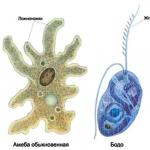The viscosity of the blood is great value for normal functioning the human body, and especially for of cardio-vascular system. normal level blood viscosity is considered to be 4-5 mPa s, any deviations from this value can lead to serious disturbances in the functioning of organs and systems human body.
Increased blood viscosity
Clinical manifestations thick blood are drowsiness, fatigue, general weakness, increased arterial pressure, depressive states, headache, dry mouth, absent-mindedness, nodules, heaviness in the legs and constantly cold extremities.Thick blood is the cause of the formation of blood clots in the vessels and heart, blockage of blood clots in the lumen of blood vessels, acute heart failure, a decrease or increase in blood pressure, ischemic or hemorrhagic stroke, acute lung failure and aortic aneurysms.
Blood viscosity can be reduced with cinchona preparations, phosphoric acid, long moderate work, high level oxygen in the blood, increase body temperature with hot baths.
Decreased blood viscosity
Too much liquid blood observed in the restoration of the volume of its plasma with a significant reduction in the number of blood cells. Clinical manifestations of low blood viscosity are its poor clotting, bleeding, bleeding from the nose, gums, kidneys, gastrointestinal tract, enlarged spleen, low blood pressure, Iron-deficiency anemia.Reduced blood viscosity can be increased by inhaling ether vapors, drinking alcohol, lowering body temperature, drinking less fluid, increasing blood carbon dioxide levels, limiting consumption table salt below physiological need, using diuretics, diaphoretics and antipyretics, eating more protein and starchy foods, eating less often, but in large quantities and increasing the intensity of work.
Factors that determine blood viscosity
Blood viscosity is affected by hematocrit, blood temperature, blood flow, and vessel diameter. Hematocrit refers to the proportion of red blood cells in general composition blood: the lower the percentage of hematocrit, the thinner the blood, and vice versa, as the percentage of hematocrit increases, the blood becomes thicker. Each degree decrease in body temperature reduces blood viscosity by two percent, and each degree increase in body temperature increases blood viscosity by the same amount. Rapid blood flow provokes a decrease in its viscosity - due to decreasing adhesion, that is, adhesion, of cells and proteins, as well as cells with each other. Smaller diameter blood vessels will reduce blood viscosity due to lower hematocrit levels. Also, various infections affect blood viscosity.We know well that it is necessary to carry out prevention cardiovascular diseases, strengthen the heart muscle, and very often we do not pay attention to the state of our blood. But the state of the entire cardiovascular system, and ultimately the health of the whole organism, largely depends on the state of the blood.
Blood- this is the main living environment, on the quality of which all processes occurring in organs and cells depend.
Blood consists of two parts: plasma (liquid part) and formed elements suspended in it (erythrocytes, leukocytes and platelets).
The main function of blood is transport function. It consists in the transfer by blood of respiratory gases (oxygen and carbon dioxide), hormones, minerals and many other substances to organs and tissues.
In case of violation of the quality of blood, primarily thickening, acidification, increased cholesterol, blood sugar, etc., its transport function is hindered, which leads to a violation of redox processes throughout the body, including in the heart, brain, liver, kidneys and etc. This is why it is so important to maintain blood quality within optimal homeostasis.

Causes of blood clots
Very often, the main cause of thick blood is a lack of water in the body. If the body does not have enough water for its life, then it extracts it from the blood, which leads to a decrease in the mass of the liquid part of the blood and it becomes more viscous.
Can lead to blood clots diabetes, drinking alcohol, smoking, hypothermia and even stress.

What does a person feel if he has thick blood?
Increased blood viscosity does not differ in any way characteristic symptoms. Blood clots are often accompanied general weakness, drowsiness, headache, memory impairment, absent-mindedness, fatigue, depression. Many people develop dry mouth, high blood pressure. Venous nodules may appear on the legs, the limbs are constantly cold.
Such symptoms can appear in many other diseases and we rarely associate our bad feeling with the presence of thick blood.
Sometimes there are no symptoms at all and hypercoagulability is detected by chance during blood tests. This is why annual checkups are so important.
How to confirm the fear that you have thick blood?
In order to determine if you really thick blood, you must pass the following tests: general analysis blood, blood coagulation test and bleeding duration, coagulogram, hematocrit (the sum of all blood elements - erythrocytes, leukocytes, platelets, in relation to the total blood volume).
What is dangerous thick blood
Thick blood leads to a slowdown in blood flow, which leads to oxygen starvation and disruption of organ trophism. The most formidable consequence of an increase in blood viscosity is the formation of blood clots.
If you do not pay attention to the symptoms in time and do not eliminate the causes of blood clotting, then very unpleasant consequences can occur.
Thick blood can cause hypertension, heart failure, atherosclerosis, thrombosis, heart attack and stroke.
More often, thick blood occurs, of course, in the elderly, but there is a tendency to increase the number of young and middle-aged people with this pathology. In men, increased blood viscosity is more common than in women. Very high risk of myocardial infarction in young men with increased amount red blood cells and hemoglobin, which do not pay attention to their health. But by eliminating the causes of blood clotting, they could avoid it.

What to do if you have thick blood
To solve the problem of thick blood, doctors usually prescribe Aspirin (1/4 tablet per day) and other drugs based on it (Aspirin-cardio, Cardiopyrin, Cardiomagnyl, ThromboASS), as well as Coumadin (Warfarin).
I want to tell you on the prevention of blood clots and the treatment of folk remedies .
Many people drink very little pure water, replacing it with tea, coffee, and sweet soda. An adult should drink 2 - 2.5 liters of fluid per day, of which at least 1 liter should be pure water. Even more in the heat. Teach your children to drink water. Natural water is a very powerful remedy against blood clotting and thrombosis.
Follow a diet for thick blood
If you have thick blood, you need to watch your diet. Eliminate fatty and fried foods, smoked meats, canned food and marinades. Sugar and any other sweets are not recommended.
Limit foods that thicken the blood. Here is their list: meat broths, fatty meat, sausages, aspic, bananas, mangoes, cabbage, cream, White bread, chokeberry, viburnum, lentil, grape juice, wild rose, buckwheat.
But don't worry, there are plenty delicious foods which, on the contrary, will help thin the blood.
Products that help thin the blood: garlic, beets, ginger, blueberries, raspberries, strawberries, apples, cherries, plums, lemon, orange, grapefruit, pomegranate, cucumbers, zucchini, tomatoes, red bell pepper, artichoke, sprouted grains of wheat, sea fish, cocoa, dark chocolate, sunflower seeds.
For blood thinning, products containing the amino acid taurine are recommended. Most taurine is found in seafood (fish, shellfish, shrimp, etc.). These products should be consumed at least 2-3 times a week. Please note that when cooked, the amount of taurine in food is significantly reduced. Therefore, to obtain the required dose, you should take high-quality dietary supplements with taurine.
 Consume regularly sea kale. Dry seaweed can be ground in a coffee grinder and eaten instead of regular salt.
Consume regularly sea kale. Dry seaweed can be ground in a coffee grinder and eaten instead of regular salt.
An additional source of Omega - 3 unsaturated fatty acids is an linseed oil, which can be taken one tablespoon per day. Prostaglandins synthesized from these acids lower cholesterol levels and thin the blood. Olive oil(unrefined, cold pressed) has the same properties.
Walnut increases blood viscosity, but in combination with other herbs it is used in the treatment of atherosclerosis, varicose disease, consequences of a stroke, etc. The same applies to Japanese Sophora.
A large amount of salt increases the viscosity of the blood.
Physical activity
Don't forget about motor activity. To support circulatory system in healthy condition need to move. It can be running, swimming, fitness, dancing, yoga - any sports that you like.
Running is the easiest and most accessible of them. Many people think that you need to run in the morning, but this is not so. In the morning, blood viscosity is increased and it is not easy for the heart to push it through the vessels even without a load. It is better to run in the evenings, and in the morning you can do a light workout.
Give up smoking and alcohol
They significantly increase blood viscosity.
Attention! Diuretic, hormonal and contraceptives, as well as Viagra - thicken the blood.
Medicinal herbs that thicken the blood
These herbs include: plantain, shepherd's bag, highlander, tansy, valerian, horsetail, St. John's wort, burnet, corn silk, nettle ( fresh leaves). Herbs should be drunk in courses and in no case constantly.
Medicinal herbs that thin the blood
To thin the blood in traditional medicine used: wormwood, chicory, lungwort, meadowsweet, evading peony, hawthorn, lemon balm, red clover, ginkgo biloba, Caucasian Dioscorea, willow bark, mulberry, acacia, sweet clover, horse chestnut (but only its peel, the chestnut fruits themselves are very poisonous), aloe juice and kalanchoe.
Traditional medicine recipes for thick blood

Much is known in folk medicine. effective means capable of replacing aspirin. I will share with you some of them.
1. Meadowsweet (meadowsweet).
1 st. pour a spoonful of meadowsweet with one glass of boiling water and insist for 30 minutes. Strain and drink like tea. A decoction of the meadowsweet is indicated for various problems with blood and vascular system, tumors. It improves memory, cleanses blood vessels, and has a sedative effect. May replace aspirin.
2. Horse chestnut.
Fruit horse chestnut crush with a hammer and collect the brown peel. Discard the fruits themselves (they are poisonous), and pour 50 g of the peel into 0.5 liters of vodka. Infuse for 2 weeks in a dark place, then strain. Take 2 - 3 times a day, one teaspoon, mixed with ¼ cup warm water. Drink on an empty stomach. You can eat no earlier than 30 minutes after taking the tincture.
3. Nutmeg.
Grind nutmeg. 100 g of nutmeg pour 0.5 liters of vodka. Infuse for 2-3 weeks in a dark place, then strain. Drink 20 - 30 drops in ¼ cup of warm water, 3 times a day 30 minutes before meals.
4. Garlic, honey and lemon.
1/3 can of finely minced garlic and 2/3 vodka. Bank of any size. We insist for 2 weeks in a dark place, shaking every 2-3 days, then strain. Add honey and freshly squeezed lemon juice to the tincture in a ratio of 1:1:1. To stir thoroughly. Take one tablespoon 1 time per day at bedtime. Store in a dark cool place.
Biologically active additives (BAA)
- Flavit - dihydroquercetin powder (obtained from Siberian larch and Dahurian larch wood). For prevention, take one capsule daily.
- Dihydroquercetin - is made from the same raw materials. Take one tablet 1 time per day.
- Kapilar - the raw material is the same. Reduces blood viscosity. Take 1 - 2 tablets 3 times a day.
For the prevention of blood clotting, these drugs are used in courses of 3 weeks. Break between courses 7 - 10 days.
Hirudotherapy for blood clots
by the most effective method traditional medicine in the fight against increased blood viscosity - hirudotherapy (treatment with leeches). Leeches, injecting saliva containing many different enzymes (including hirudin), can significantly improve the properties of blood and reduce its viscosity.
Many people are faced with such a problem as thick blood, and are interested in what should be proper treatment this pathology. In fact, at high viscosity There are many causes of blood, and in order to deal with this symptom, you must first determine which of them led to such consequences. Of course, this condition cannot be ignored: viscous blood can lead to the development of myocardial infarction, ischemic stroke, impaired blood supply to the limbs, so treatment should be started immediately - before serious consequences appear.
Blood viscosity depends on the properties of plasma, the number of formed elements (mainly erythrocytes), their tendency to aggregation and deformation. This indicator is relative: the viscosity of water is taken as a unit. Normal values range from 3.5 to 5.4 for whole blood and from 1.9 to 2.6 for plasma (slightly higher in men than in women). As a rule, viscosity is determined by analysis of plasma proteins, fibrinogen and prothrombin. In addition, the hematocrit obtained from clinical analysis. Based integral assessment These indicators can make a conclusion about the viscosity of the blood. Direct analysis of viscosity with a viscometer is extremely rare.
It should be remembered that this indicator changes with age, the norms differ especially in children and adults. A newborn child has a lot of mature erythrocytes and their precursors, due to which the blood viscosity reaches 10-14. Already on the fifth or seventh day, this number begins to decrease, as the function improves. external respiration. By the end of the first month of a child's life, this value may come to figures close to adults.
In addition, blood viscosity increases during pregnancy. Despite the fact that in biochemical analysis a woman expecting a baby general content proteins can be lowered, the viscosity of the blood is very high compared to the usual figures. The thing is that by the end of pregnancy, fibrinogen increases by about 70%. Also, pregnancy leads to an uneven increase in the content of other blood coagulation factors. There is an increase in fibrinolysis products.

In addition, during pregnancy, immunoglobulins are actively produced and the albumin / globulin ratio decreases, which means that viscosity increases. For a woman expecting a baby, this is not dangerous: after giving birth, the indicator will go down. In addition, during pregnancy, expectant mothers are constantly monitored by doctors, so there is no reason to worry.
There is evidence that blood viscosity in adults increases with age. If the numbers are not very large, then everything is in order: this is a natural process due to the aging of the body. However, it is best to monitor your health more closely and re-take tests from time to time.
What pathologies cause increased blood viscosity?
One of the reasons for the increase in viscosity is an increase in the content of formed elements in relation to plasma. In this case, the hematocrit in the blood test is more than 50%. There are several factors leading to these changes:
- dehydration of the body (with cholera, very intense diarrhea, etc.),
- erythrocytosis,
- polycythemia,
- rheumatoid arthritis,
- immune complex disease, etc.
According to the same principle, the blood is locally thickened: for example, with inflammation. Such local changes do not pose a danger to humans.
Also, the viscosity increases with, in particular, with an increase in the level of proteins and especially with a shift in the equilibrium towards macromolecular compounds. We have already noted that such a picture is normally observed during pregnancy, but it also occurs in pathology. In particular, with infections due to increased synthesis of immunoglobulins. Another disease that makes the blood thick this mechanism- paraproteinemia. Myeloma also belongs to this group.

The viscosity of the blood is largely dependent on the clotting process. Fibrinogen levels are of great importance. If the analysis shows that it is increased, then the viscosity will be more than normal. A striking example the influence of hemocoagulation on the properties of blood - DIC. In its first phase, coagulability increases significantly, multiple small blood clots form, and the viscosity also increases greatly.
Another reason that the blood thickens is a slowdown in blood flow. Under such conditions, erythrocytes begin to stick together, forming aggregates, which can also increase the viscosity and impair blood flow. Very often, this situation is observed in people who have a diagnosis of " cardiovascular failure". Its particular case is a decrease in human body temperature during general hypothermia.
Therapy for this condition
Increased blood viscosity is extremely unpleasant symptom, which can indicate serious illnesses. When deciphering the analysis, it is very important to determine which indicators are deviated from the norm in order to make a competent conclusion. It is on it that all recommendations for the treatment of a person will be built. It is very important to pay attention not only to the symptom, but also to the causes that caused it. If this is not the case, then full treatment is impossible.

There are cases when it is enough to establish nutrition with thick blood (for example, when the body is dehydrated). This is very important factor for women during pregnancy. The thing is that the needs of the child increase the needs of the mother's body, so she needs more calories, vitamins, trace elements, and of course, water. Therefore, the doctor should explain to the expectant mother how she should eat during pregnancy. If there is no dehydration, the thick blood diet is of secondary importance. The main recommendation is the rejection of "heavy" food: forbidden fatty, fried, salty.
If there are problems with the coagulation system, then treatment may be prescribed medicine from the group of antiplatelet agents or anticoagulants.
Only a doctor can make a conclusion about the need for the use of these drugs. A person must strictly follow his recommendations all the time: if he does not do this, then he may develop serious illness such as heart attack, stroke, or foot gangrene. If there is erythrocytosis, polycythemia, etc., specific therapy is needed, which is individually designed for each such disease.
You can not try to treat thick blood with folk remedies. This is inefficient and even dangerous. traditional healers offer "miraculous" herbs that supposedly thin the blood. As long as you drink such a decoction and be treated with folk remedies, precious time will go away. Moreover, there is no guarantee that such folk remedies basically harmless. No need to try to cure this symptom at home: the sooner qualified health care, all the better.
The symptom of increased blood viscosity is very serious. It should by no means be ignored. It either indicates an existing disease, or may lead to the development of a disease in the near future. Therefore, competent and timely treatment just necessary. Therapy should be carried out exclusively under the supervision of a physician - all other unconventional ways are not allowed.
Blood viscosity test: Plasma proteins prothrombin and fibrinogen are not critical.
Doctor, phytotherapist, nutritionist Boris Skachko
Blood viscosity is very important indicator blood, which determines maximum term services of the heart and blood vessels. The higher the viscosity of the blood, the faster the heart wears out. And by increasing blood pressure, the heart checks the vessels for strength, the resistance of vessels to a heart attack, stroke.
What gives you a blood test for viscosity? The answer to a very simple question. Will you wake up tomorrow or not. Those. go to work or only your obituary will be at the checkpoint of your company. The viscosity of blood varies over a very wide range. At the same time, a lot of factors affect the state of the blood. A critical increase in blood viscosity puts the entire cardiovascular system and its owner on the brink of survival. An increase in blood viscosity must withstand the power of the heart muscle (without acute heart failure, a decrease or increase in blood pressure). And the strength of blood vessels without acute vascular insufficiency in the form of myocardial infarction, ischemic or hemorrhagic stroke. Those. an increase in blood viscosity increases cardiac risk or the risk of sudden death.
It is traditionally believed that the viscosity of the blood
determine only the plasma proteins prothrombin and fibrinogen. Those. to assess blood viscosity, they are guided by the level of prothrombin, which should be at the lower limit of the normal range of 70-100%, and the amount of fibrinogen within - 2-4 g / l.However, an equally important indicator is the erythrocyte sedimentation reaction (ROE) or, as they used to call the erythrocyte sedimentation rate (ESR). Those. the ability of blood cells to settle, forming plasma above the blood column. The reaction is estimated in 1 hour. The lower the ESR (ROE), the higher the viscosity of the blood. And many rejoice, receiving ROE (ESR) in the value of 1-3 mm per hour! And at the same time, blood viscosity is very high and the heart is forced to pump viscous blood with a significant overload!
When a traditional blood viscosity test is performed, then usually only the level of prothrombin and the amount of fibrinogen in the blood are analyzed - i.e. rely only on part of the blood components that determine rheological properties or blood plasma fluidity ,not blood in general! Occasionally, ROE (ESR) is also taken into account. Using a dark-field microscope, one can analyze a living drop of blood, identify other blood components that determine the ability of blood to easily move through the vessels. And also what kind of load does the heart muscle experience and blood vessels while providing proper blood circulation.Prothrombin and fibrinogen are the most numerous proteins in blood plasma. And blood plasma represents approximately 50% of the blood volume. And evaluating only these two components, reveal only a part of the factors that determine blood viscosity.
The amount of albumin proteins also affects blood viscosity. Although albumins do not take part in the work of the blood coagulation system, they perform important role- bind various toxins and promote their transfer to the main organs of excretion - the liver and kidneys. Those. promote self-cleansing of the body, cleansing the blood of a variety of toxins. The amount of albumin in the blood affects not only the viscosity of the blood, but also the tendency to allergic diseases activity of nonspecific immunity.
Influence on blood viscosity of other components of blood plasma.
In the blood plasma there are other substances that contribute to the adhesion (agglutination) of red blood cells and determine the viscosity of the blood. These are cholesterol, glucose, and protein digestion products. Cholesterol level. the content of which in the blood serum depends on the state of the liver. As well as the ability of the pancreas to control blood sugar levels by moving glucose into cells for metabolism. As well as the ability of the liver to process the products of protein digestion and turn them into protein molecules peculiar only to you.
The remaining 50% in the blood is occupied by the actual blood cells - erythrocytes (approximately 99% of the volume of all blood cells), as well as platelets and leukocytes. Cellular composition blood also affects the rheological properties of blood. In assessing blood viscosity, both the number of erythrocytes is important (it increases in professional athletes, with regular fitness, in the gym, with pathologies of the respiratory system, heart and circulatory system), and the degree of agglutination of erythrocytes and platelet aggregation. Those. the ability of the most numerous blood cells to stick together.
Influence of ecology on blood viscosity.
In recent years, the ecological environment of a person has changed significantly, and the number of natural products nutrition. Which largely affected the balance of the antioxidant system of the body and the amount of free radicals that are formed in the body modern man. Blood, occupying a strategically important position in the body, connects the system of barrier organs through which, together with the inhaled air, food and drinks, a variety of xenobiotics from environment. AND working area(actually the cell), where during any work the formation of waste products ("slags") and the production of free radicals occur.
Why does blood viscosity change?
Being at the intersection of two powerful streams of toxins (ecology on the one hand and intensity of work on the other), the state of the blood reflects the contribution of each component to the rheological properties of the blood. Rather, individual characteristics human body, the ability to withstand the surrounding ecology.
If the antioxidant potential (the ability to produce and accumulate antioxidants) in your body is high, the blood will be more fluid and such a person is prone to longevity. And the most numerous blood cells in this case, when analyzing a live drop of blood, are located separately.
If the antioxidant potential of the body is low, the most numerous blood cells, erythrocytes, agglutinate with each other, forming bizarre structures resembling coin columns or tiles. Increases blood viscosity and many risks.
How to evaluate the viscosity of blood in general?
If you conduct a blood test for viscosity usingdark field microscope, then you can identify the contribution of each component: the genetic characteristics of your body, the environmental burden placed on it and the individual tolerance of the intensity of work. As well as the amount of waste products, or “slags” of metabolism, or homotoxins, accumulated in the body throughout life. And having identified the contribution of each component to blood viscosity, it is easy to make an individual correction.
Blood viscosity: treatment of VVD, NCD, depression, hypertension
Why do you need a blood viscosity test?
Most common cause death from cardiovascular diseases. In about 50% of people (and in Ukraine - 67%), the main cause of death was cardiovascular diseases. And in the work of the cardiovascular system, three factors are of great importance: the power of the heart muscle, strength, elasticity and patency of blood vessels and blood viscosity. If the first three factors are relatively stable, they slowly change throughout a person's life. That blood viscosity can quickly change within a fairly wide range. Both upwards and downwards. And with high blood viscosity, put the entire cardiovascular system on the brink of the possible (hypertension, ischemic disease hearts). And with sudden changes in blood viscosity, test the regulation system (VSD, vegetative-vascular dystonia).
Vegetative-vascular dystonia (VVD, vegetodystonia) is a multifaceted disease that reflects the ability of your body to provide blood circulation despite the high blood viscosity. At IRR organism turns on the regulation system in emergency mode, because at the same time, vessels with increased tone through which blood enters the tissue. And overly dilated vessels, in which vascular tone fell and blood circulation slowed down. Why is it called "dis" - violation, "tonia" - vascular tone. And one of the main reasons is an increase in blood viscosity.
Moreover, if with viscous blood the power of the heart muscle is enough, it appears VVD attack hypertensive type. Those. banal increase in blood pressure. Vegetodistonia of the hypertensive type is often called the first stage of hypertension (EH), if there is a more constant increase in pressure in the vessels.
If, in the presence of viscous blood, the vascular tone is weakened, hypotension or vegetodystonia appears according to the hypotonic type. Those. blood pressure 90/60-100/70 mm Hg. In this case, the metabolism slows down, because. along with the pressure level, the pulse pressure also decreases (the difference between the upper and lower is less than 40 mm Hg. This is enough dangerous state, because providing cells (especially the brain) occurs at a minimum possible values. And an additional factor that increases blood viscosity or reduces vascular tone ( exercise stress, hot shower, bath, Finnish sauna, Russian bath, emotional stress etc.) can lead to either headache or loss of consciousness.
The fact that it is important for the inhabitants of Ukraine to know what your personal blood condition is is evidenced by statistics. The rate of increase in the frequency of detection of diseases of the cardiovascular system by 55.3% over the past 10 years! And the specific mortality rate for 10 years increased from 56% to 67%. Those. if 10 years ago every second Ukrainian died from diseases of the cardiovascular system, now it is already 2 out of 3!
Who needs to know blood viscosity?
Everyone. It's not just about people old age in which the heart has already lost its former power, and the vessels - strength. The frequency of heart attacks between the ages of 20 and 50 increases 100 times! But even in children, high blood viscosity can cause acute heart failure (fortunately, rarely). But children die from acute heart failure both in Ukraine and in Russia!!!
Much more often, high blood viscosity in children and adolescents is manifested by disorders of the vegetative nervous system, is manifested by exacerbation of vegetative-vascular dystonia (vegetodistonia, VVD). And the child or teenager complains of intermittent dizziness, frequent flashing of flies before the eyes, headache etc. Up to loss of consciousness, which is a protective act. If vascular tone with high blood viscosity keeps blood in the vessels, acute heart failure may develop, which is often an irreversible condition. Now you can easily determine the state of the blood of your children and spread straws in advance!
What else can revealdark field microscope?
fibrinogen spicules. The blood plasma protein fibrinogen not only determines the viscosity of the blood, but also shows the amount of toxins, carcinogens that are in the blood plasma. Those. your body's ability to resist oncological diseases. And this is the second most common cause of death! The individual state of the blood, detected usingdark field microscope, allows not only to see changes in a living drop of blood, but also to determine the means and methods for correcting the state of the blood.
Fatigue, dizziness, headaches, irritability, memory impairment, vision impairment - these are just a few signs of thick blood. Viscous blood- a serious signal of the body about a problem in health.
Blood can be called the "river of life" in our body, too important processes depend on her.
When it thickens, capillary blood flow slows down, as a result, stagnation occurs, oxygen starvation in the tissues, all systems and organs suffer, the heart and brain have to work in emergency mode. High risk of thrombosis, strokes, heart attacks.
Increased blood density is called hyperviscosity syndrome, also hyperviscosity syndrome.
In the article:
1. About the functions performed by blood.
2. Syndrome of increased viscosity.
3. Blood viscosity is normal.
4. Why the blood becomes thick.
5. Signs of thick blood.
6. Causes of increased blood density. Risk factors.
The functions of the blood in brief:
- Transport - the most important, this is gas exchange, transfer nutrients, heat, hormones, etc.
- Ensuring immune responses and homeostasis (stable internal balance).
- Regulation of the intake of salts (electrolytes) and water into the body,
- Creation of protective barriers on the way of alien bacteria and viruses, own defective cells.
Fulfillment of all these important tasks occurs due to the complex composition:
- liquid extracellular part - plasma,
- suspended formed elements (cell mass) - erythrocytes, platelets, leukocytes;
- enzymes, hormones, ions, other substances.
The density of the blood is determined by the balance of plasma and cell mass, the liquid part should be more so that blood can flow freely into the most small vessels and capillaries.
Viscosity Syndrome
Hyperviscose syndrome is understood as a number of changes in the rheological (fluid) properties of blood:
- an increase in the density of blood in general and plasma,
- increase in hematocrit (hematocrit number).
The hematocrit measures the fraction of the total blood volume shaped elements. If the balance shifts towards the cell mass, the blood thickens.
Hematocrit balance at normal condition blood - 4:6, where 4 is the uniform part, and 6 is the plasma.
In men, the hematocrit is higher than in women due to the presence of androgens ( male hormones) that thicken the blood.
- High hemoglobin, and specifically - the level of heme (jelly-containing part) and globin (protein).
- Decreased elasticity and ability of erythrocytes to deform.
Due to the ability to deform, acquire various forms, erythrocytes penetrate into microvessels, delivering oxygen to tissues.
- Increased fibrinogen synthesis.
Fibrinogen is a special protein responsible for blood clotting. Its increased content in the blood leads to aggregation of erythrocytes, the formation blood clots(thrombi), the development of thrombosis.
- Aggregation (reinforced gluing) of erythrocytes.
RBCs carry a negative charge and repel each other. With a shifted balance of acids and alkalis to the side acid environment(blood acidification), erythrocytes lose their original polarity, and instead of repulsion, they are attracted and stick to each other.
Cell clusters are formed, similar to coin columns or tiles, from 25-50 erythrocytes.
- Increased production of paraproteins.
In pathological conditions, plasma cells intensively produce paraproteins - special proteins that report a failure in the body to all organs so that they are rebuilt to the required mode.
Normal blood viscosity
The density of the blood healthy people- 1.050 -1.064 g / ml. Given value determined by the volume of cell mass, lipids, proteins in the blood.
The viscosity of blood is measured by a viscometer device that compares the speed of blood movement with respect to distilled water at the same temperature and volume.
The norm is the flow of blood 4-5 times slower than water.
The density of female blood is lower than male. Democritus is normal in women - 37-47%, in men 40 - 54%. This difference is due to different hormonal system and physiology.
Why does the blood get thick
Blood viscosity is caused by many reasons. The most common:
Lack of enzymes(fermentopathy, sometimes congenital) - a pathology in which food enzymes are absent or insufficiently active, food is not completely broken down, the blood is contaminated with under-oxidized decay products, acidifies, red blood cells stick together, cells and tissues starve without oxygen.
Poor quality water: chlorinated, destructured, carbonated, polluted.
due to a deficiency of vitamins and minerals (vitamin C, selenium, lecithin, zinc, calcium, magnesium, etc.), which supply the enzymes and hormones she needs.This leads to a change in the chem. plasma composition, increase its viscosity. Increased load the liver carries with the use of canned, smoked, meat, salty, sweet products. Living in areas of unfavorable ecology and working in hazardous industries also harm the liver.
Disrupted blood balance: more cell mass than plasma.
Summary
Senile dementia, impotence, atherosclerosis, heart attack, stroke - far from complete list diseases associated with impaired circulation. People are being overwhelmed various diseases, but the cause of death is very often the same - viscous thrombosed blood.
Good blood quality is a basic condition for health and active longevity. It is vital to exclude factors that cause blood clotting. Be sure to pay attention to your well-being.
Fatigue, distraction, drowsiness, memory loss, heaviness in the legs - possible signs thick blood.
Elena Valve for the Sleepy Cantata project.





